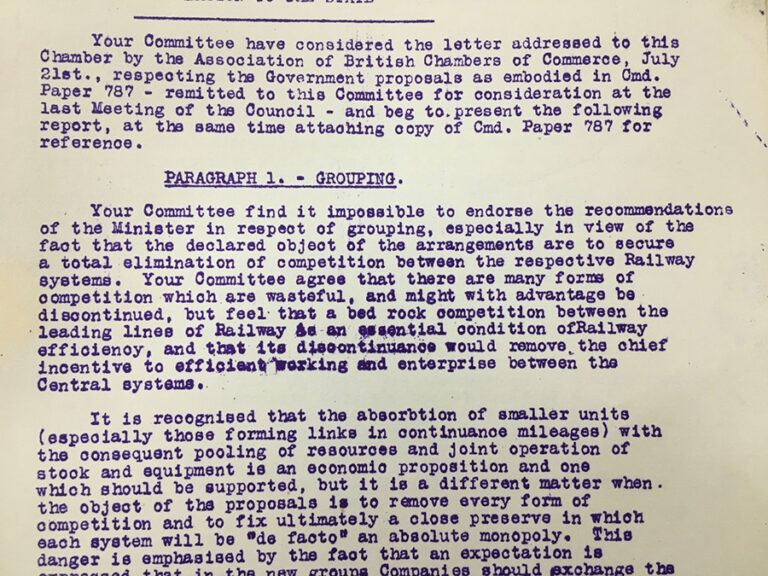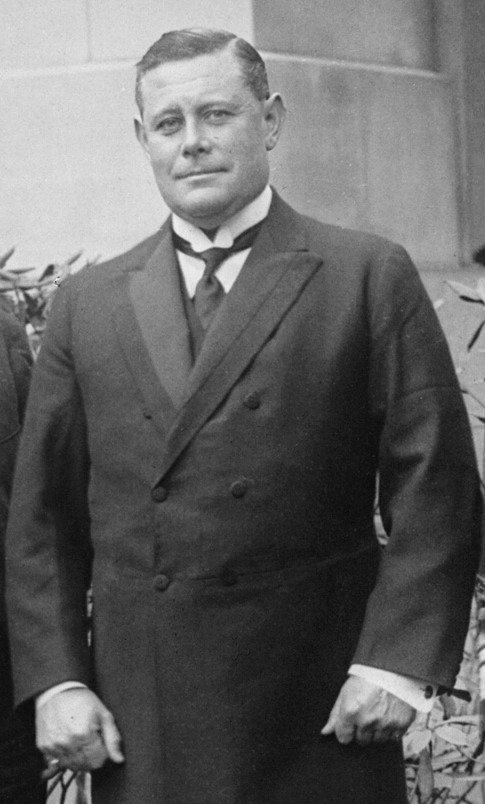This blog article is part of the 20sPeople season – a season of exhibitions, activities and events from The National Archives that explores and shares stories that connect the people of the 2020s with the people of the 1920s.
Eric Geddes was the first person to take up office as the Minister of Transport, 103 years ago today. In post during a period of post-war austerity, his time in post was marked by heavy cuts to public expenditure.
A quick search on the newly released 1921 Census for England and Wales shows that 428,615 people were identified as working for a railway company in 1921. The railways were certainly a major employer at the start of the 1920s, and there were more than 100 separate railway companies operating across Britain. However, many of these companies were in direct and wasteful competition with each other; there were many unprofitable routes, and some companies were struggling to make money. The companies blamed the Government for giving in to claims for higher wages and shorter working hours.
Sir Herbert Walker, Manager of the London and South Western Railway, blamed recent legislation, saying that ‘perhaps the most wicked thing that had ever been perpetrated on the community was the introduction by the Government of the 8-hour day’. This had increased costs in a single stroke by 25%, and personnel by 76,000 as companies hired more staff to cover the work. The wages bill had risen from £47 million before the First World War to £173 million by 1921.
During the First World War the Government had taken control of the railways, which had introduced an overarching view of the network as a whole, and had reduced some of the unnecessary competition. In peacetime, however, the Government wanted to avoid complete nationalisation due to the risk of potential mismanagement and political compromise. It was therefore decided to combine the existing separate companies into several large monopolies, privately owned, and in limited competition with each other, based on geographical regions of the country. The man in charge of the operation was Minister of Transport, Sir Eric Geddes who, in 1920, initially proposed combining most of the existing railway companies into eight new groups across Britain. This was refined into a white paper later the same year, in which six or seven groups were suggested.

The plans were immediately opposed by the Railway Companies’ Association (RCA) – and by other groups. The Railways and Transport Committee of the Birmingham Chamber of Commerce, for example, felt that the total elimination of competition would remove the chief incentive to efficient working and enterprise between the new companies.
Various amendments were made to Geddes’s proposals during 1921, but the Railways Act 1921 was finally passed in August of that year. Government control remained in place for another two years before the new ‘Big Four’ railway companies were officially launched on 1 January 1923: The Great Western Railway, the London Midland and Scottish Railway, the London and North Eastern Railway, and the Southern Railway.

Sir Eric Geddes had achieved his aim, a feeling with which he was familiar. Born in India in 1875 to Scottish parents, he was sent to school in Scotland where he refused to co-operate, and was removed from seven different schools in the space of 10 years. He left for America at age 17, working on a freight train as a brakesman with the Baltimore and Ohio Railroad, as a labourer in a steel factory, and at various saw mills before being brought home to Scotland at his father’s expense, and sent off to India to work on the railway, clearing forests. Eleven years later he was offered a job in the North Eastern Railway where he worked his way up to senior management. By 1916 he had moved to the Ministry of Munitions, received a knighthood, and by 1917 he was Inspector-General of Transportation with the rank of Major-General in the British Army, a Vice-Admiral in the Royal Navy, and MP for Cambridge. The following year he was a member of the War Cabinet, and in 1919 he became Minister of Transport.
Known as a man of prompt decision, invincible determination and exceptional organisational skills, he reportedly carried an air of complacent jollity. His no-nonsense enthusiasm for work perhaps served to tarnish his reputation when, in 1921, he was appointed Chairman of a committee to examine all questions of public spending, and his subsequent report became known as the ‘Geddes Axe’. His report was drastic in the extreme, so much so that the Government could not actually bring itself to enact many of the cuts he suggested. Never one to stand still, he retired from politics in 1922 and became Chairman of the Dunlop Rubber Company, and Chairman of Imperial Airways Limited.
Geddes died at the age of 61 in 1937 at his residence, Albourne Place in Sussex, leaving his wife Gwendolen and three sons. Those who knew him remarked upon his massive physique, forceful personality, and his ability to bring vigour and determination to bear when these qualities were required. Besides the ‘Geddes Axe’ he will be remembered as one of the men who changed the railways in Britain for good. Breaking with tradition and achieving his goals by the shortest possible route, and with considerable momentum, he epitomised life during the Roaring 1920s.
20sPeople at The National Archives
20sPeople at The National Archives explores and shares stories that connect the people of the 2020s with the people of the 1920s. Accompanying the release of the 1921 Census of England and Wales, 20sPeople shows what we can learn by connecting with those who have gone before us. Find out more at nationalarchives.gov.uk/20speople.

